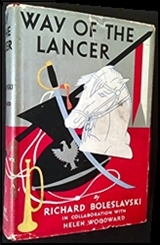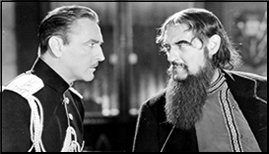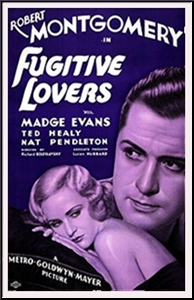Mon 30 Dec 2019
Dan Stumpf on Director RICHARD BOLESLAVSKY.
Posted by Steve under Films: Drama/Romance , Movie stars & directors , Reviews[13] Comments
by Dan Stumpf

The highlight of my recent reading has been Way of the Lancer (Bobbs-Merrill, hardcover, 1932) by Richard Boleslavsky and Helen Woodward, an autobiographical novel of Boleslavsky’s experiences (and, I suspect, those of man others that he incorporated and told as his own) for — and against — Russia in the first World War.
It’s an intriguing account, Boleslavsky was not a Russian but a Pole; his nation had been dominated by Russia since about 1750, and when the Great War got serious, Russia promised Freedom to Poland if her sons would fight for Russia. Austria promised roughly the same thing, so regiments of Poles fought for both sides, against enemies who were often their brothers.
Boleslavsky describes an interesting vignette off weary, “victorious” Poles escorting even wearier defeated Austrians to POW camps and finding relatives in their midst, tiredly catching up on the news as they slog through the mud to no place in particular.

Boleslavsky, incidentally, was a Polish soldier, but not a Lancer. He passed the war as a film-make, attached to the Lancers, doing semi-documentary propaganda films. After the War, he gravitated to Hollywood, where he directed some truly remarkable movies, like The Garden of Allah, with Dietrich and Boyer, and the cynical, moving 1936 version of Three Godfathers, and others.
His Hollywood debut was Rasputin and the Empress (a portrait of the breakdown of Imperial Russia that must have seemed very real to him), the only film to star all three Barrymores. It’s an interesting show, but not a great one. John seems ticked off that he didn’t get to play Rasputin, and sulks through the whole movie with marked disinterest until the scene where he gets to kill Lionel, which is really quite memorable.

Boleslavsky also directed one of the two Three Stooges movies you should make an effort to see: Fugitive Lovers (MGM, 1933), a dandy little thing about Robert Montgomery as an Escaped Con being pursued with cold precision by C. Henry Gordon, catching a bus with aspiring chorus girl Madge Evans, who is herself being pursued by dumb, possessive, aspiring gangster Nat Pendleton. Also onn board are Ted Healy and his stooges,whose time onscreen is mercifully brief.
Boleslavsky fills the film with sudden cuts and jarring camera angles that seem avant-garde even today, and make Citizen Kane look antiquated before its time. And he maintains the pace and drama quite nicely throughout, right up to a howling blizzard that had my teeth chattering despite the fact that it was done entirely inside a studio. You should look for this one.

December 30th, 2019 at 4:22 pm
My apologies to Dan for omitting several hundred words from this essay. Not seen here is a much longer discussion by Dan of Boleslavsky’s autobiographical account of his experiences as a soldier in WWI.
I’ll post that as a separate review at some later date. I promise!
December 30th, 2019 at 4:29 pm
As a film, FUGITIVE LOVERS is almost entirely unknown. The only other external review of it on IMDb is by Laura of Laura’s Miscellaneous Musings, and she wrote that 10 years ago.
I remember watching this on TCM, but it’s apparently never been given an official DVD release.
December 31st, 2019 at 12:13 am
Have only seen a little of his work.
I remember NOT liking:
Men in White
Theodora Goes Wild
The Last of Mrs. Cheney
Will have to track down some of the films recommended here.
December 31st, 2019 at 12:48 am
Mike, he also did the outstanding 1936 version of Three Godfathers with Chester Morris, Lewis Stone and Walter Brennan. I was snobbish about it but my wife did not let me get away with that. The picture, and performances, especially Morris, are wonderful.
December 31st, 2019 at 7:22 am
Just remembered that I’d also seen and liked “The Painted Veil” with Greta Garbo. It’s a lively film, and better than the others I’ve seen, although hardly a classic.
Boleslavsky is considered important in the history of American theater: he’s the man who brought Method acting from Moscow to the USA.
Boleslavsky was likely hired in Hollywood because of his prestige as a New York stage director.
Boleslavsky was an actor too in his early days. He appeared in a major film directed by the great Carl Theodor Dreyer, “Love One Another” (1922).
As far as I can tell, most film historians have zero interest in Boleslavsky / Boleslawski. This article is the first clue I’ve ever seen that some people actually like his films.
His remake of “The Garden of Allah” is admired for helping to pioneer color cinematography. But this is credited to the photographers, not director Boleslavsky.
December 31st, 2019 at 11:26 am
Which film historians, Mike, and does it matter, as opinions and values change generation by generation. Boleslawski made many good pictures, don’t like some or all of them, a personal privilege, but well acted, well photographed films do not happen in a vacuum; the director, and often enough no matter how unpopular the concept, the producer, are entitled to credit. For example, Bogart is now considered the greatest star of all time, well — untrue in his time. Just a successful performer. AS for the ‘two greatest films, Vertigo and Citizen Kane, you have to be an intellectual snob to go along with those conclusions, although Kane is at least beautifully shot and produced. As for Vertigo, I want my money back. No shaggy dog stories, please, unless they are about shaggy dogs.
December 31st, 2019 at 12:54 pm
As best I can tell it’s just a historical fact:
I can’t find ANY film historians who have much interest in Boleslawski.
The much-praised color photography of “The Garden of Allah” is the big exception.
That doesn’t mean that Boleslawski’s films are bad.
Or that people today can’t offer fresh opinions!
December 31st, 2019 at 1:34 pm
Here, according to Wikipedia, are the films Boleshavsky made in the US:
The Grand Parade (1930), choreography only
Treasure Girl (1930 short)
The Last of the Lone Wolf (1930)
The Gay Diplomat (1930)
Rasputin and the Empress (1932), teaming Ethel, John, and Lionel Barrymore
Storm at Daybreak (1933)
Beauty for Sale (1933)
Fugitive Lovers (1934)
Men in White (1934) starring Clark Gable
Hollywood Party (1934)
Operator 13 (1934)
The Painted Veil (1934), featuring Greta Garbo
Clive of India (1935)
Les Misérables (1935), with Fredric March and Charles Laughton
Metropolitan (1935)
O’Shaughnessy’s Boy (1935)
Three Godfathers (1936)
The Garden of Allah (1936), starring Marlene Dietrich and Charles Boyer
Theodora Goes Wild (1936), featuring Irene Dunne
The Last of Mrs. Cheyney (1937) starring Joan Crawford and William Powell (Boleslavsky died before this film was completed)
I wonder if he had lived longer — he died one month short of his 48th birthday — if his legacy in the eyes of film critics and historians would have been greater.
December 31st, 2019 at 2:32 pm
Steve,
Not much of a question about that. Rasputin and the Empress, Clive of India, Les Miserables, Garden of Allah, and Theodora Goes Wild, which launched the beautiful and talented Irene Dunne onto her comedic period, the others all well received by both critics and the public. Another way to judge, is how many talented and successful people were willing to work with him. This guy was not just a capable craftsman.
January 1st, 2020 at 9:32 am
You can get ideas of what film historians are interested in from websites like:
Senses of Cinema: Great Directors
http://sensesofcinema.com/category/great-directors/
And from books like the giant (850 page) textbook “Film History” by Kristin Thompson and David Bordwell.
I’d be the first to insist that many fine directors have been left out of both. That’s inevitable: film history is overwhelmingly large! Still you can learn a lot from both. They are written by people with enormous scholarly knowledge of film.
January 1st, 2020 at 9:53 am
I read Mystery*File because I want to LEARN!
This is the same reason I read Kristin Thompson and David Bordwell. They know far more about film history than almost anybody.
I’ve learned from Dan Stumpf’s post on Boleslawski, and will check out his recommendations, if I can track down copies.
January 1st, 2020 at 10:46 pm
I saw FUGITIVE LOVERS on TCM, it’s a remarkable film visually.
Nice to know more about Boleslawski, always an interesting director.
January 2nd, 2020 at 8:35 am
Unlocks many facts of which I was not aware.
Boleslowski sounds an intersting man and the book sounds inriguing. I have seen and admire a number of the movies listed and will now revisit some of them.